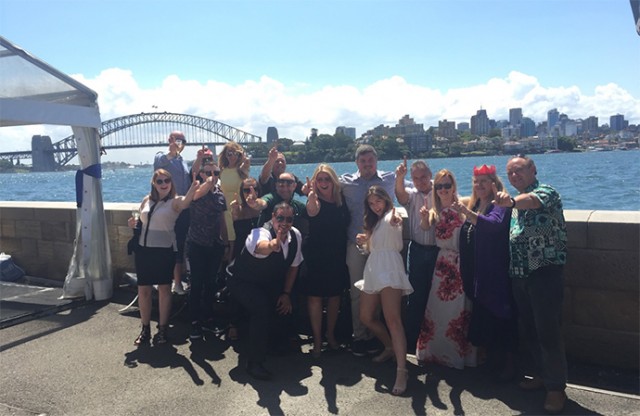The Western Weekender today officially celebrates its 25th birthday. The first edition of the Penrith-based publication was released on Friday, March 15, 1991.
The Weekender has changed dramatically over the last quarter of a century but has always remained an important part of the local community.
“It was tough going in the early days – the work that went into producing a publication without the technology we enjoy today was immense,” said Western Weekender Managing Editor, Troy Dodds.
“Those early publications look a little rough, but the passion that went into them is very clear. That passion still exists today in each edition that we produce.”
The Weekender has created hundreds of local jobs over the past 25 years and launched the careers of countless journalists who have gone on to successful careers in the media.
HUMBLE BEGINNINGS
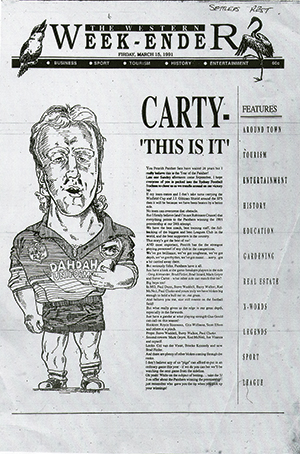
Officially, our first publication was released on March 15, 1991.
John Cartwright was on the cover, perhaps indicative of the relationship and passion the paper would develop for rugby league in the district. Ironically, the Weekender started in the same year that the Panthers won their first premiership.
The Weekender back then was very different to the Weekender you see today (much like Penrith itself has changed). Over the past 25 years, it has evolved and changed dramatically, and today stands as one of the most successful independent publications in the country.
The beginning of the Weekender journey was quite simple – a group of business people thought the city was getting a bad name and wanted to produce a publication that presented the positive side of Penrith.
For the best part of two decades, the Weekender was Penrith’s ‘good news’ newspaper.
And while we still very much pay homage to that intent today, the Weekender has evolved to be a true local newspaper – breaking significant stories, investigating the issues that matter to you and informing the local community better than anybody else.
EDITOR’S FOND MEMORIES
As the newspaper’s longest serving Managing Editor, Bernard Bratusa made a significant contribution to the Western Weekender.
After a short stint managing the newspaper’s finances in 1993, Mr Bratusa noticed something was missing, and suggested the paper needed to reshape its focus.
“The model was wrong and we needed to become a paper that the people would talk about at the water cooler,” he said.
“At the end of the day, the Western Weekender was about giving the city of Penrith a good newspaper, because there are so many good stories to talk about.”
In November that year, Mr Bratusa kicked off his 15 year career as Managing Editor.
“My first front page was one of Penrith’s icons, Ross Sinclair, and we were promoting and seeking community support for WestCare,” he said.
“Ross had a trolley full of food, and to me that symbolises what Penrith is all about, people wanting to give to make it a better city.”
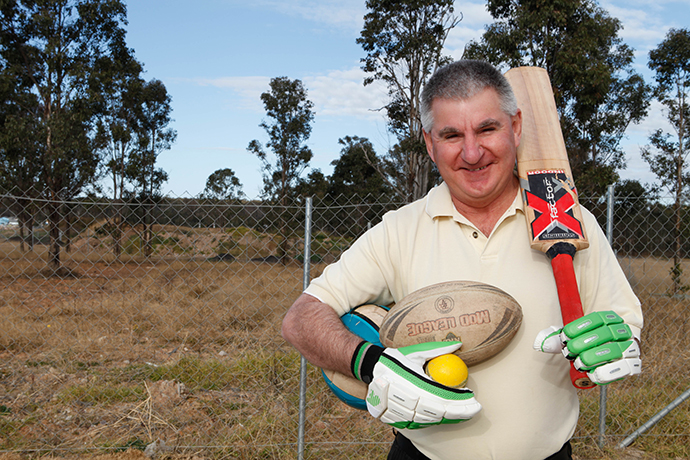
Until his departure in January 2009, the Weekender created life changing opportunities not just for Mr Bratusa, but everyone who worked under its roof.
“The one thing that stuck with me were the people we got to meet through running a local newspaper, it was a great tool for young journalists coming through,” he said.
“There are so many success stories to come out of the Weekender, it’s a real vehicle for young people to get into the media scene and progress their futures.”
Mr Bratusa said the Weekender was and still is grassroots reporting at its absolute best.
“The Weekender makes an important contribution to the media landscape of western Sydney and Penrith,” he said.
“I wish the new owners and the staff every success that they are celebrating another 25 years then another 25 after that.
“The Western Weekender is as Penrith as the Nepean River, and that’s just an opinion.”
ADVERTISING IS A KEY
The hard work of the Western Weekender’s team of passionate and dedicated sales representatives has achieved much more than just selling advertisements.
The Weekender’s Sales Manager, Simon Gould has overseen the team for the last five years, and said it’s really important they foster a relationship with advertisers.
“Partly because it’s good business to help your customers grow, but because they really want to see these people be successful,” he said.
“Some of these guys have been here longer than me, and their relationship goes beyond a provider-customer relationship. It becomes a friendship.”
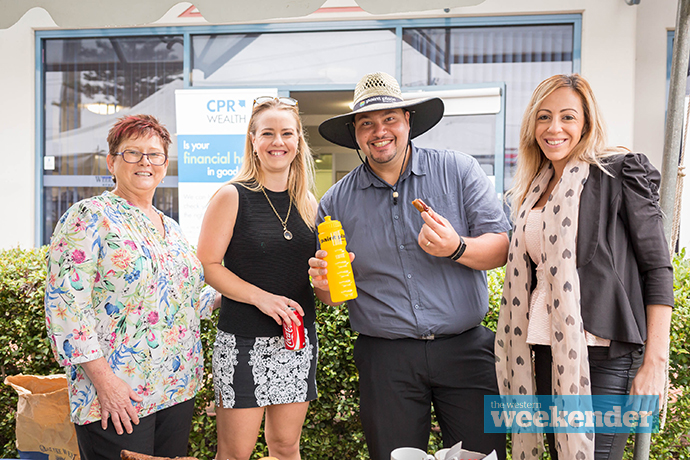
In becoming friends with their clients, the sales team are genuinely interested in that client’s business and look for every chance to help them prosper.
“Whenever they see an opportunity to grab a little bit of extra coverage through editorial they will do that,” Mr Gould said.
“There’s no way it’s going to benefit the sales representative, it’s purely motivated by doing the right thing for somebody they have formed a really good relationship with.”
The nine sales representatives are at the front foot of the Weekender, with hundreds of interactions with the businesses community every week.
The Weekender boasts the largest on the ground media sales team in the Penrith area.
WHERE ARE THEY NOW?
Adam Scroggy worked at the Weekender and its then sister papers in Blacktown and Hawkesbury for four years covering everything from general news to sport.
After leaving the Weekender, Adam continued to work in the media and is now the Chief Sub Editor at Citrus Media, a magazine publisher in Surry Hills. He is also the Editor of Cricket Australia’s match-day programs.
“The great thing about the Weekender is that it has launched the careers of so many young western Sydney journalists,” Adam said.

Emily Crane worked at the Weekender for four and a half years covering news, politics and crime. One of the biggest stories Emily worked on was the burning down of the famous Log Cabin, where she was granted exclusive access to inspect the terrible aftermath.
After leaving the Weekender, Emily landed a role at Channel Nine and Ninemsn before moving to news website Daily Mail Australia.
“I will forever be grateful to the team for hiring me and allowing me to juggle work and uni at the same time,” Emily said.
Katherine Tweed worked at the Weekender for more than three years covering community and seniors news, fashion and crime. Her biggest story during her time at the Weekender was by far the exclusive with a local woman who made national headlines after she was arrested in China for suspected drug trafficking.
After leaving the Weekender, Katherine landed a role in fashion and is now the Social Media and Content Manager at fashion label My Friend Alice and fashion sales website Missy Confidential.

Stacey Moseley worked at the Weekender for two years covering entertainment, community news and sport. She was also the Weekender’s fashion columnist during her time.
After leaving the Weekender, Stacey moved into the public relations world and is now LJ Hooker’s Network PR and Communications Manager.
“The Weekender has a great reputation in nurturing and developing young local writers. I feel very privileged having spent my formative years there under the leadership of Troy Dodds,” Stacey said.
A FUTURE WITH DIGITAL AND PRINT
When the first edition of the Western Weekender went to print in 1991 the media landscape looked very different to the increasingly digitised world we live in today.
Print publications ruled and online news sources were still in their infancy.
Before the invention of social media platforms such as Facebook, Twitter and Instagram, the local newspaper was the primary source of information for the community.
Though the Weekender’s aim to be the voice of the local community hasn’t changed, the way in which we reach our readers has diversified over the last 25 years.
Starting off as a weekly newspaper, the Weekender now communicates with its readers through several different platforms, including online through the Weekender website and social media platforms such as Facebook, Twitter and Instagram.
“Our print edition will always be our number one focus and the core of what we do, but social media allows us to be in people’s hearts and minds seven days a week – not just one,” Weekender Managing Editor, Troy Dodds said.
“Social media also gives us an instant response from readers – and quite often the response we predict turns out to be something completely different in reality.”
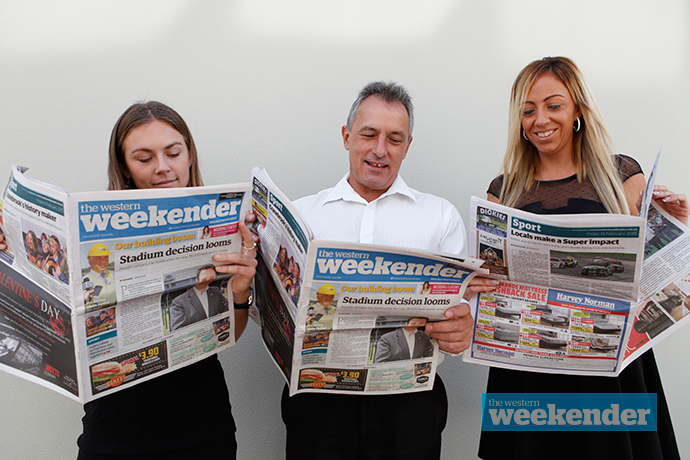
While many have predicted the downfall of print media, Mark Hollands, Chief Executive of The Newspaper Works, said that though an increasingly digital world does mean that some print media will disappear, there are areas that are likely to grow in strength.
“Strong print media performances continue to come from community-focused newspapers, both in urban and regional markets,” he said.
According to Mr Hollands, the important thing for any print publication is to consider the preferences of their audience and continue to make use of new technology.
“Importantly print titles must embrace and position themselves on digital platforms, especially social,” he said.
“Obvious cross-market synergies exist and a publication that steadfastly ignores digital will already be isolated.”
As for the future of the Weekender, our aim is to continue to provide high quality local content while embracing an ever changing technological environment.
LOCAL IS KEY
The Western Weekender continues to defy print industry trends, and current Editor Troy Dodds believes it comes down to one key thing.
“When we say we’re local, we mean it,” he said.
“We have local ownership under Kathryn and Ian Garton. We have local journalists on the ground covering everything from Council to the Panthers. We have the biggest on the ground media sales team in Penrith and we produce the paper right here in Jamisontown with our local production team.
“Our staff live and breathe Penrith. They know Penrith better than anyone and being truly local is a major key to our success.”

